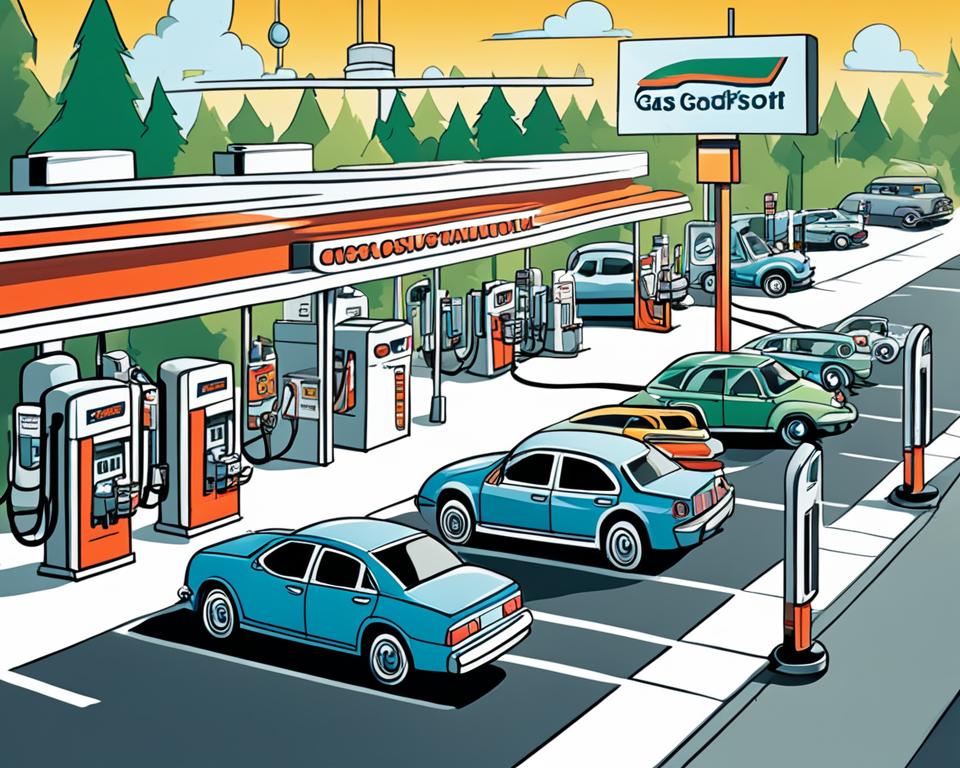Introduction:
Investing in gas station stocks can be a lucrative opportunity for investors looking to capitalize on the fuel industry’s essential role in the U.S. economy. Gas stations play a vital role in supplying approximately 80% of the country’s motor fuels. Despite the challenges posed by competition and oil price volatility, the gas station industry can yield profitable returns when market conditions are favorable.
Key Takeaways:
- Investing in gas station stocks offers potential opportunities to benefit from the demand for fuel in the U.S. economy.
- Understanding the dynamics of the gas station industry is crucial before making investment decisions.
- Gas stations are part of the downstream segment of the oil industry and play a vital role in fuel distribution.
- Profit margins from convenience items sold at gas stations can significantly impact overall revenue.
- Challenges, such as oil price fluctuations and the rise of electric vehicles, can influence the gas station industry.
Table of Contents
How Gas Stations Fit Within the Oil Industry
Gas stations are an essential component of the oil industry, specifically belonging to the downstream segment which encompasses refining and distribution. This segment focuses on the final stages of the oil supply chain, where refined products are made available to consumers.
Many integrated oil companies, such as ExxonMobil, Chevron, and BP, have retail assets in the form of gas stations. These companies either own and operate their gas stations or license them to independent operators. By having a presence in the retail sector, these integrated oil companies can establish brand visibility and capture a portion of the market share.
In addition to gas stations owned by integrated oil companies, there are also standalone gas stations that are owned by single-store operators or larger independent companies. These independent operators play a significant role in the industry, offering competition and diversity in the market.
The Role of Gas Stations
Gas stations serve as the interface between oil companies and consumers. They are responsible for providing a convenient location for fueling vehicles and offering an array of services and products to meet customers’ needs. Gas stations not only sell gasoline and other fuel types but also provide ancillary services such as vehicle maintenance, car washes, and convenience stores.
Speaking of convenience stores, they form an integral part of gas stations, contributing to the overall revenue. These stores offer a range of goods, including snacks, beverages, and other convenience items. In the United States, the majority of convenience stores that sell fuel are owned by single-store operators or larger independent companies.
Gas stations play a vital role in ensuring the smooth functioning of the oil industry, meeting the demand for fuel from consumers while providing additional services to enhance customer experience. They act as essential links in the oil supply chain and contribute significantly to the overall revenue generated by the industry.
How Gas Stations Make Money
Gas stations generate revenue through a variety of channels, primarily from fuel sales and the sale of convenience items. Let’s explore how gas stations monetize their operations.
Fuel Sales
When customers fill up their vehicles at a gas station, they pay for the fuel they consume. Gas stations purchase fuel at a wholesale price from suppliers and then sell it at a retail price to customers. The difference between the wholesale and retail prices is the profit margin that gas stations earn.
Convenience Items
In addition to fuel sales, gas stations also generate significant revenue from the sale of convenience items. These items include snacks, beverages, cigarettes, lottery tickets, and other everyday essentials. The gross profit margin on these items can be much higher compared to the profit margin on fuel.
Gas stations strategically position their convenience stores to attract customers who may need to make quick purchases while refuelling. This approach maximizes the potential for additional sales and increases the overall profitability of the gas station.
The Profit Breakdown
| Revenue Source | Contribution |
|---|---|
| Fuel Sales | Approximately 60% of total revenue |
| Convenience Items | Remaining 40% of total revenue |
While fuel sales constitute the majority of a gas station’s revenue, the net profit from gasoline sales is relatively small compared to the profit from convenience items. Gas stations rely on the sale of convenience items to boost their gross profit margins and overall profitability.
Understanding the revenue breakdown of gas stations helps investors and industry observers comprehend the financial dynamics and make informed decisions. Now that we’ve explored how gas stations generate revenue, let’s delve into the threats facing the gas station industry in the next section.
Threats to the Gas Station Industry
The gas station industry has faced challenges with sales volatility in recent years due to various factors. Two significant threats include oil price fluctuations and improvements in vehicle fuel efficiency.
The price of oil greatly impacts the profitability of gas stations. When oil prices rise, gas stations face higher costs for purchasing fuel, which can squeeze their profit margins. On the other hand, when oil prices drop, gas stations may struggle to adjust their retail prices quickly, leading to lower profit margins.
Another threat to the gas station industry is the increasing vehicle fuel efficiency. As cars become more fuel-efficient, they require less gasoline, resulting in reduced fuel sales for gas stations. This trend is further amplified by the rising popularity of electric vehicles. As more people switch to electric vehicles, the demand for gasoline decreases, posing a significant challenge to the fuel sales revenue of gas stations.
In addition to the decline in fuel sales, gas stations also face a threat to their convenience store revenue. With the convenience store industry gaining popularity and offering a wide range of products, gas stations need to compete to attract customers. If gas stations fail to provide a compelling convenience store experience, customers may choose to purchase their snacks, beverages, and other convenience items elsewhere.
To stay competitive and adapt to these threats, gas station operators need to explore alternative revenue streams and diversify their offerings. Some gas stations have started investing in electric vehicle charging stations to cater to the growing number of electric vehicle owners. Others have introduced innovative convenience store concepts that prioritize customer experience and offer unique products.
The gas station industry has shown resilience and adaptability in the face of challenges. By embracing change, exploring new technologies, and staying informed about industry trends, gas stations can continue to thrive even in an evolving market.
Top Gas Station Stocks
While the majority of gas stations are owned by single-store operators or larger independent companies, there are some publicly traded options for investors interested in gas station stocks. These stocks provide investment opportunities in the booming gasoline industry and offer potential for growth in the fuel retail sector. Here are some of the top gas station stocks to consider:
| Company | Stock Ticker |
|---|---|
| Casey’s General Stores | CASY |
| CrossAmerica Partners | CAPL |
| Getty Realty | GTY |
| Global Partners | GLP |
| Marathon Petroleum | MPC |
| Murphy USA | MUSA |
| Sunoco LP | SUN |
| TravelCenters of America | TA |
These gas station stocks represent established players in the industry with a strong presence in their respective markets. Before investing, carefully analyze the financial performance, growth prospects, and industry trends. It’s essential to consider factors such as brand reputation, diversification, and any ongoing developments that may impact the stock’s value.
Gas Station Stocks to Buy
If you’re looking to invest in gas station stocks, there are several key players in the industry worth considering. These stocks offer potential investment opportunities and can be a valuable addition to your investment portfolio.
Marathon Petroleum Corp
A prominent player in the gas station industry is Marathon Petroleum Corp. With a strong presence in the refining and retail segments, Marathon Petroleum Corp is a well-established company that can provide stability and growth potential for investors.
ExxonMobil Corp
ExxonMobil Corp, one of the largest publicly traded oil and gas companies globally, also operates gas stations that can be an attractive investment option. The company’s diverse portfolio and global reach make it a reliable choice for investors looking to buy gas station stocks.
Valero Energy Corporation
Valero Energy Corporation is another notable player in the gas station industry. With a focus on refining and marketing, Valero Energy Corp offers opportunities for investors seeking exposure to the gas station sector.
Chevron Corporation
Chevron Corporation, a major integrated energy company, operates gas stations under its brand name. Investing in Chevron Corporation can provide investors with exposure to the gas station market while benefiting from the company’s diversified operations.
BP Plc
BP Plc is a leading global energy company that also operates gas stations. Investing in BP Plc can offer investors a chance to capitalize on the company’s extensive network of gas stations and global presence.
Phillips 66
Phillips 66 is an integrated energy company that owns and operates gas stations across the United States. Consider investing in Phillips 66 for exposure to the gas station sector and the potential for long-term growth.
Murphy USA Inc
Murphy USA Inc is a well-known operator of gas stations and convenience stores in the United States. With a focus on customer convenience and value, investing in Murphy USA Inc can be a smart choice for those interested in gas station stocks.
ConocoPhillips
ConocoPhillips, a global energy company, operates gas stations under its brand name. Investing in ConocoPhillips can offer investors exposure to the gas station industry while benefiting from the company’s diverse portfolio and strong financial performance.
Total Energies SE
Total Energies SE, a multinational energy company, operates gas stations worldwide. Consider investing in Total Energies SE to gain exposure to the global gas station market and capitalize on the company’s extensive network.
Petrobras
Petrobras is a leading Brazilian energy company that also operates gas stations. Investing in Petrobras can provide investors with exposure to the gas station industry and the potential for growth in the Brazilian market.
When considering gas station stocks to buy, it’s essential to conduct thorough research and evaluate each company’s financial performance, market position, and growth prospects. By diversifying your investment portfolio and considering these gas station stocks, you can take advantage of the potential opportunities in the industry.
Gas Station Stocks List
During periods of rising gas prices, gas station stocks can perform well. Investors looking to capitalize on this trend should research the following companies:
- ExxonMobil
- Chevron
- Valero Energy
- Phillips 66
- Murphy USA
These companies have demonstrated growth potential and offer opportunities for investment in the gas station industry.
Conclusion
Investing in gas station stocks can be a profitable venture, providing opportunities for growth in the gasoline industry. Despite the challenges faced by the industry, gas stations play a vital role in the economy, selling around 80% of motor fuels in the United States.
By understanding the dynamics of the gasoline industry and applying smart investment strategies, investors can unlock the potential of gas station stocks. It is important to consider factors such as fuel sales, convenience item revenue, and the resilience of the industry to overcome challenges like oil price fluctuations and the rise of electric vehicles.
When looking for profitable investment opportunities, it is advisable to research top gas station stocks such as Casey’s General Stores, CrossAmerica Partners, Getty Realty, Global Partners, Marathon Petroleum, Murphy USA, Sunoco LP, and TravelCenters of America. Additionally, companies like Marathon Petroleum Corp, ExxonMobil Corp, Valero Energy Corporation, Chevron Corporation, BP Plc, Phillips 66, Murphy USA Inc, ConocoPhillips, Total Energies SE, and Petrobras offer potential investment options.
With careful analysis and a long-term perspective, investing in gas station stocks can prove to be a rewarding choice for investors seeking opportunities in the gasoline industry.


